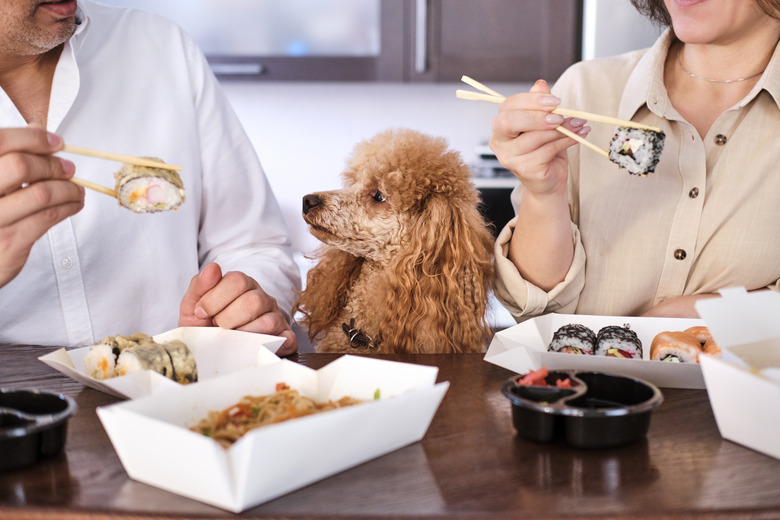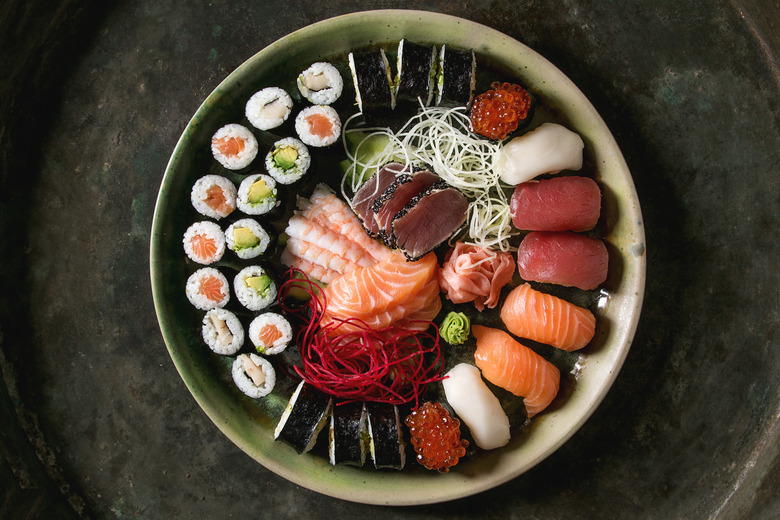Can Dogs Eat Sushi?
Sushi is quite a delicacy, whether it's made with raw fish, seafood, or vegetables, it's a hand roll or cut roll, and it comes with tempura or without. You enjoy eating your sushi with fresh ginger and dipping it in a soy sauce, eel sauce, or spicy mayonnaise dip.
While you could go for a sushi roll anytime of day, you wonder: Is it safe to share with your pup? Should you break out the chopsticks for Fido or keep them to yourself? Finding out if dogs can eat sushi is vital before you pass the California roll or share some fresh sashimi and seaweed with your pup.
Where does sushi come from?
Where does sushi come from?
The word sushi describes the Japanese dish that includes white or brown rice that's made with salt and sugar, seaweed, and ingredients that you choose, like raw fish, crab, shrimp, octopus, carrots, avocados, or cucumbers. It can be cooked or raw, and cut into pieces or delivered in a hand roll.
Even though most people think that sushi originated in Japan, it actually came from Southeast Asia. It started in a location around the Mekong River and became popular in China before making its way to Japan. However, today, Japan is credited with creating this fantastic food. You can find sushi just about anywhere around the world, at restaurants, in grocery stores, and even at some gas stations.
Can dogs eat sushi?
Can dogs eat sushi?
The answer is "it depends." Dogs can eat sushi depending on what's in the sushi. Breaking down what the sushi is made of is going to give you a clearer idea about what your dog can and cannot eat.
For example, dogs can eat brown and white rice. In fact, if your dog has a stomachache, your vet will likely recommend giving him boiled rice. Dogs can eat seaweed, as long it's not the wild and dried out kind found on beaches.
Raw fish is not inherently bad for dogs, but you do have to watch out for parasites. If your dog has a weak immune system or is dealing with worms already, then do not feed him raw fish. Instead, order cooked fish like salmon, tuna, whitefish, and cod. Dogs can eat shellfish, but they should only eat it cooked. They can eat the meat of the shellfish, but not the shell.
While carrots, cucumbers, and mangoes are just fine for dogs, avocados are not because they contain persin, which is a substance that can cause your dog to have nasal congestion, difficulty breathing, vomiting, diarrhea, and an accumulation of fluid around his heart.
Dogs cannot eat fried food, such as tempura, so avoid giving your dog any roll you order with tempura around it.
Are there any health benefits to giving dogs sushi?
Are there any health benefits to giving dogs sushi?
Brown and white rice are very nutritious for dogs. They can digest it easily, it contains fiber, and it will help with any GI issues they might be having. Cooked fish is great for dogs, since it contains omega-3 fatty acids that can keep their skin and coat looking healthy and shiny. Shrimp is full of vitamin B3, vitamin B12, and phosphorous, plus it's nutritious.
Seaweed is healthy for dogs because it is easy to digest, keeps the skin and coat healthy, and is filled with amino acids. Dogs love cucumbers in sushi because they're crunchy; they're also healthy for them to boot. Mangoes are high in fiber and contain vitamins A, C, E, and B6. Carrots are also healthy and good for dogs' teeth. They contain fiber, potassium, and vitamin A.
The best ways to feed sushi to dogs
The best ways to feed sushi
to dogs
To feed sushi to your dog, you could give him a whole piece or cut it up into tiny pieces for him. Don't give him too many, because many of the ingredients are only healthy in moderation. For example, while cucumbers are very healthy, brown rice is highly caloric, so you want to avoid feeding your dog too much of it at once.
Are there any concerns with feeding sushi to dogs?
Are there any concerns with
feeding sushi to dogs?
When feeding sushi to dogs, make sure you avoid those no-no ingredients like avocados, tempura, and raw fish. Also, don't put any sauces on it, especially spicy ones like wasabi and spicy mayo, which could upset your dog's stomach.
Also, as stated above, be extremely careful feeding raw fish to dogs. While it is not necessarily bad for them, there is always the risk of parasites, and there is no reason to feed your dog an excessive amount of raw fish. If you want to give your dog fish, it's safest to cook it first.
Conclusion
Conclusion
Feeding your dog sushi is safe if you follow the feeding guidelines and avoid the ingredients that are not recommended, and do not feed your dog large amounts of raw fish. Like all "people foods," it's best given in moderation as an occasional treat. If your sushi contains additional ingredients, make sure you check out our list of everything dogs can and cannot eat for more tips on what to feed your pup.
Always check with your veterinarian before changing your pet's diet, medication, or physical activity routines. This information is not a substitute for a vet's opinion.


